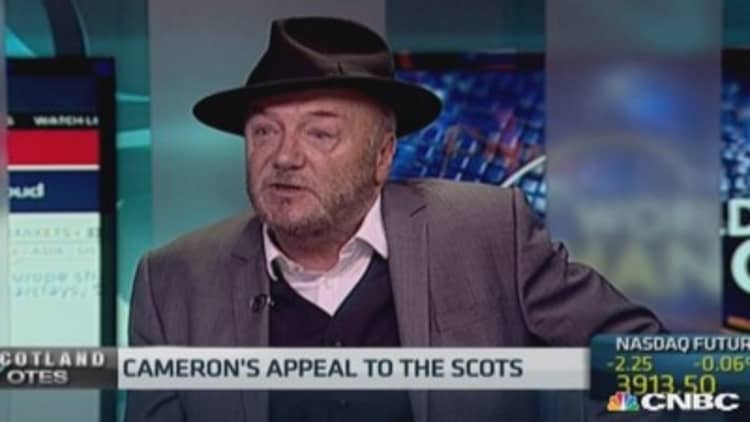
As America's July 4 celebrations get underway, it might not be long before Scotland has its very own independence day. Scots will vote on whether the region should quit the U.K. in just 75 days, but British lawmaker George Galloway warned that breaking away would result in a "race to the bottom".
Maverick politician Galloway, an MP with the extreme-left Respect Party, told CNBC that the prospects for working people would be reduced in both Scotland and England if the countries split.
"There will be a race to the bottom. Cutting costs, taxes, expenditure and regulation. And that's not in the interest of workers," he said. "It seems to me a great pity to tear it asunder in the interests of no one that I can see except the petty nationalist politicians."
Read MoreScottish independence stirring voters: Poll
But Galloway, who is himself a Scot, said he was optimistic the No campaign would win a "resounding victory".
An average of nine polls conducted last month put the No vote at 42 percent, and the Yes vote at 30 percent. Some 28 percent of those polled said they were undecided.
Despite opposing political ideologies, Galloway's sentiments were shared by British Prime Minister David Cameron, a Conservative, who argued the economic reasons for maintaining the union were clear.
"We are stronger and more prosperous together," he said at a rally in Perth, Scotland, on Thursday. "We live in a competitive world where other countries are on the rise, other people are challenging for our jobs and our industries. What sense does it make at a time like that to start separating yourself off into different economic unions?"
Read MoreScotland independence: Widnae it work?
Schroders, which has over £265 billion ($454.5 billion) under management, said an independent Scotland would battle with a "huge fiscal deficit". In a note published Thursday, the asset management company said Scotland could also struggle to gain the confidence of markets.
"Bottom line: an independent Scotland is highly likely to face severe economic challenges and pressures from financial markets," Azad Zangana, Schroders' European economist, wrote.
Oil hopes?
The Scottish National Party, which has spearheaded the Yes campaign, has pointed to North Sea oil and gas reserves as a major source of revenue for an independent Scotland.
Read MoreScottish independence is bad for business
If the resources were shared on a geographical basis, according to Schroders, Scotland would receive around 90 percent of future North Sea oil and gas reserves.
"(This) would help it achieve a trade surplus with the rest of the world of about 4.8 percent of GDP (gross domestic product), although this is likely to be eroded by payments to overseas owners of Scottish assets," Zangana added.
Galloway, however, argued that not only were oil reserves finite, but oil prices were hugely volatile.
"We have oil, but it will be finished by 2050," he said. "Not many sensible people would gamble on an economy entirely based on a commodity that's about to run out and whose price simply cannot be calculated."


